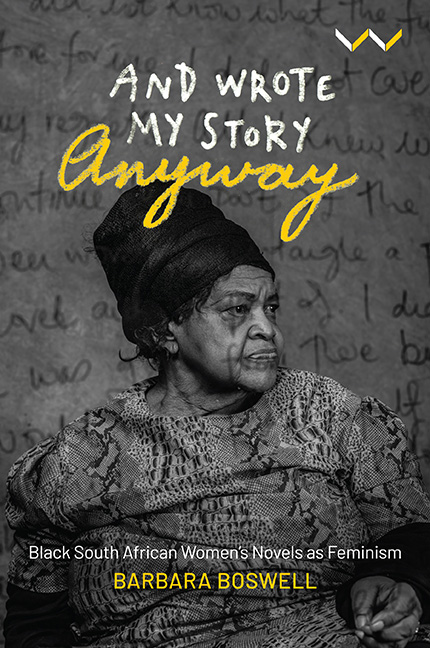Book contents
- Frontmatter
- Dedication
- Contents
- Acknowledgements
- Author's Preface
- Acronyms
- Introduction: ‘And Wrote My Story Anyway’: Black South African Women's Novels as Feminism
- 1 Writing as Activism: A History of Black South African Women's Writing
- 2 Rewriting the Apartheid Nation: Miriam Tlali and Lauretta Ngcobo
- 3 Dissenting Daughters: Girlhood and Nation in the Fiction of Farida Karodia and Agnes Sam
- 4 Interrogating ‘Truth’ in the Post-Apartheid Nation: Zoë Wicomb and Sindiwe Magona
- 5 Making Personhood: Remaking History in Yvette Christiansë and Rayda Jacobs's Neo-Slave Narratives
- 6 Black Women Writing ‘New’ South African Masculinities: Kagiso Lesego Molope and Zukiswa Wanner
- Conclusion: Towards a Black South African Feminist Criticism
- Select Bibliography
- Index
Conclusion: Towards a Black South African Feminist Criticism
Published online by Cambridge University Press: 15 June 2021
- Frontmatter
- Dedication
- Contents
- Acknowledgements
- Author's Preface
- Acronyms
- Introduction: ‘And Wrote My Story Anyway’: Black South African Women's Novels as Feminism
- 1 Writing as Activism: A History of Black South African Women's Writing
- 2 Rewriting the Apartheid Nation: Miriam Tlali and Lauretta Ngcobo
- 3 Dissenting Daughters: Girlhood and Nation in the Fiction of Farida Karodia and Agnes Sam
- 4 Interrogating ‘Truth’ in the Post-Apartheid Nation: Zoë Wicomb and Sindiwe Magona
- 5 Making Personhood: Remaking History in Yvette Christiansë and Rayda Jacobs's Neo-Slave Narratives
- 6 Black Women Writing ‘New’ South African Masculinities: Kagiso Lesego Molope and Zukiswa Wanner
- Conclusion: Towards a Black South African Feminist Criticism
- Select Bibliography
- Index
Summary
This book has aimed to show the ways in which black South African women writers have made visible their standpoint on apartheid and the emerging democratic South African nation. During the apartheid era, two pioneering black novelists, Miriam Tlali and Lauretta Ngcobo, inserted into the national discourse a counter-hegemonic vision of the nation, and black women's place in it, by critiquing the nationalism that was dominant at the time. Tlali and Ngcobo's singular contribution in their novels was to analyse the construction and use of apartheid space, with Ngcobo's And They Didn't Die (1990) offering an alternative vision by reconfiguring space for a more just and equitable South African social order. Exemplars of a critical black geography (McKittrick and Woods 2007), their novels critique the dominant mode of apartheid spatiality, making visible the lives of those who inhabit its fissures and margins.
Writing during the late-apartheid era, both Farida Karodia and Agnes Sam focus on daughterhood and South African Indian identity, producing subaltern voices that question the constructs of race and femininity, as well as emergent discourses foundational to a democratic nation. Karodia's Daughters of the Twilight (1986) and Sam's ‘Jesus is Indian’ (1989) pay particular attention to the ways in which contact with colonial power and the apartheid system position the Indian girl protagonists in a liminal space between their ‘Indianness’ and colonial culture. These writings also examine the ways in which the girls negotiate their identity within the racial tumult of the apartheid years, thus anticipating young women's struggles in the democratic nation.
I have also argued that, in the post-apartheid transitional period from white domination to democracy, Zoë Wicomb and Sindiwe Magona used the discursive space opened up by the transition to interrogate androcentric nationalist rhetoric by calling into question the patriarchal, unitary nature of nationalism in their respective novels, David's Story (2000) and Mother to Mother (1998). Wicomb achieves this in David's Story by decentring the notion of a cohesive truth – which was pivotal to the nationbuilding project of the TRC. She further achieves this by recreating in her text the silences around discourses of rape within the ANC's military wing – silences reproduced by the TRC through the glaring omissions in its final report.
- Type
- Chapter
- Information
- And Wrote My Story AnywayBlack South African Women's Novels as Feminism, pp. 199 - 208Publisher: Wits University PressPrint publication year: 2021



